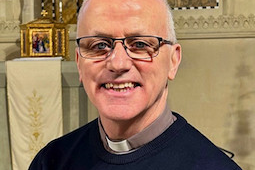Bishop Jukes' homily at TUC Mass
This Mass is offered to ask the blessing of God upon the Trade Union Congress meeting here in Brighton. I offer the Mass on behalf of the Catholic Bishops of England and Wales. In so doing, I express the sympathy and commitment of the Bishops to the trade Union movement in our countries. The movement has a vital contribution to make to the World of Work, in which human beings co-operate with the Creator in bringing this creation to the fulfilment assigned to it by God. This year, I ask your prayers for a particular purpose. That purpose is for the trade unions to play an active and constructive part in responding to the phenomenon of globalisation that is engaging much attention on all sides. By globalisation, I understand the transcending of national boundaries in ideas, communication, commercial operations and travel. Many sectors of human thought and activity have had brought into them, at least in the consciousness of each human being involved, a dimension of worldwide significance or application. This is a new phenomenon that affects the whole human race. It has great consequences, both for good and ill. As has often happened in our times, it is Pope John Paul II who has opened the dialogue on these issues, pointing to the need to reflect upon the ethical values which must be included in any such dialogue. In an address to the Pontifical Academy of the Social Sciences this year on 4 April, Pope John Paul reminds us that "globalisation, a priori, is neither good or bad. It will be what people make of it." The Pope continues: "No system is an end in itself, and it is necessary to insist that globalisation, like any other system, must be at the service of the human person, it must serve solidarity and the common good." The Pope notes that globalisation has quickly become a cultural phenomenon. What at first sight was seen as a commercial or communication advance has the capacity to become dominant in the social fabric of many nations and organisations. From this results a way of thinking and acting which can subvert or overwhelm the social and ethical norms by which society is truly at the service of its members and the common good. What has happened is that changes in technology and work relationships have moved too quickly for existing cultures to respond to the new challenges to authentic human living which the new inventions and new mentalities pose. Given the accuracy of this diagnosis of the current human condition, an ethical response must be found. The ethical response to the challenge of globalisation must start from two essential points of departure or principles. These are well expressed by the Holy Father in his address to the Pontifical Academy for the Social Sciences. The first is found "in the inalienable value of the human person, source of all human rights and every social order. The human being must always be an end and not a means, a subject and not an object, nor a commodity of trade". This first principle accords well with the traditions of the trade union movement. The unions, whose history testifies to often being formed in circumstances of injustice and oppression, can never depart from concern for the individual while preserving the necessary attention to the common good both of their members and of society. The Pope states the second principle is to be found in "the value of human cultures, which no external power has the right to downplay and still less to destroy. Globalisation must not be a new version of colonialism. It must respect the diversity of cultures which, within the universal harmony of peoples, are life's interpretative keys". So it is necessary to ensure that globalisation is held in check in those matters where it threatens to destroy those values of truth and justice, without which the human being suffers a terrible loss of dignity and society itself becomes a tyranny. Such is the power inherent in the developments inherent in globalisation that the only way that such a danger can be averted is in the construction of a common code of ethics to be freely held by all. The trade unions are in many ways uniquely placed to respond to the developments required by these two principles of the value of the human person and the construction and acceptance of a common ethical code. At first sight some might observe that trade unions, out of their obligation to defend the interest of their members, must simply oppose globalisation because of the threat to jobs and security in work it brings. Lower living costs, starvation wages, unregulated hours of work etc are commonly quoted as causing undercutting in the prices of goods, leading to unfair competition and job losses. The unions rightly protest and act against such assaults on human dignity. But such action ought to proceed from conviction about justice and solidarity with their fellow workers. It is futile to simply try to turn back the processes of enhanced communication and new inventions. The bond of sympathy and experience with fellow workers help to ensure that intervention on these matters is ethically based and not derived from self-interest. The trade unions in our countries have played a very significant role in shaping the culture of co-operation and justice at work. The TUC is respected across the world for its history and current participation in worldwide workers representative movements. The unions in our countries are part of our culture and have responsibilities for contributing to the presence of ethical values in all work activities. It is right for the TUC to continue to review its attitude to the phenomenon of globalisation. The promotion of justice and solidarity is a legitimate and urgent objective for its deliberations and actions. My hope is that the Catholics in the unions, who know that they have the encouragement of their bishops for their membership and activities in the unions, play their part in promoting confidence in the unions that there is a job to be done in respect of globalisation. That job is found in the promotion of the universal human values and ethical absolutes, which must underpin the response of those in the world of work to the challenges which globalisation offers. It is not my job to tell the TUC or its component unions how to go about this task. However, it may help to encourage those who are able to promote an initiative of assuming responsibility for meeting the challenges set by globalisation to know my mind and that of my brother bishops in this matter. It is not a waste of time or resources for individual unions or the TUC to devote their efforts to promoting ethical values across the whole world of work as it encompasses the globe. Such efforts will result in setting up barriers to the many ills which are already to be seen as flowing from globalisation; unfair competition; loss of job security; degradation of human individuals or groups forced to work in inhuman conditions. To these ills, which affect individuals, must be added the encouragement of warfare and not peace between the nations. May our prayers at this Mass give encouragement to all men and women of good will who work in this rapidly changing world, so that from the rapidly advancing means of communication and exchange of experiences and ideas, justice and peace may flourish between individuals and nations. source: CMO


















